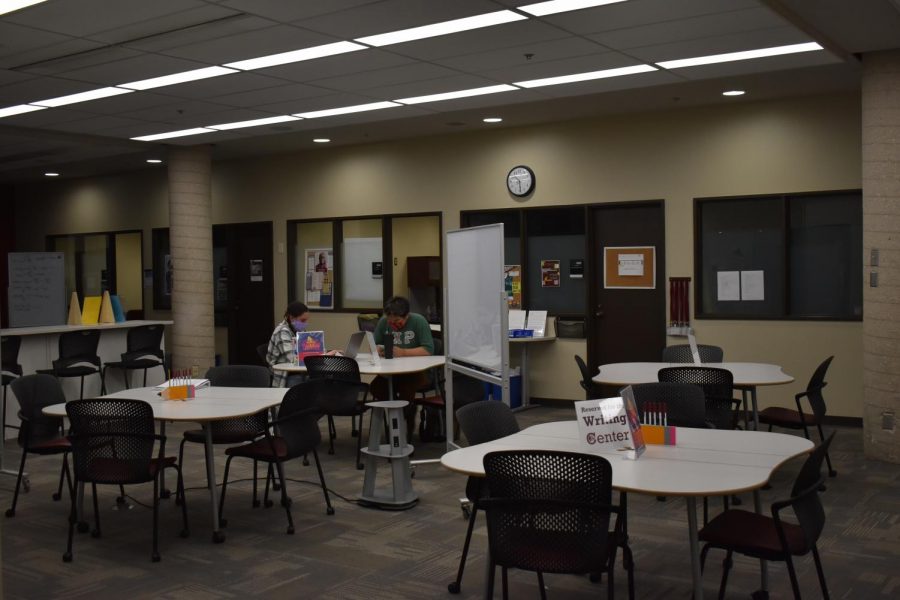Tiger Learning Commons provides academic support amid midterms
Students can find discipline-focused assistance through multiple offerings
If you have a ten page paper that needs editing, a calculus problem that you just can’t make sense of, or you just need help getting a handle on your classes this semester, you can visit the Trinity Learning Commons’ tutoring and academic coaching services.
Betty Curry, Trinity’s director for academic support, works as an academic coach and supervises the TLC, so she was uniquely able to describe what it does for students.
“It [TLC] is what I call a federation of support services. All of these services were brought together in the fall of 2017… In the TLC, there are offices for all of these support functions and a nice space in the middle with great tables that are movable, and then that is also where the QRS [Quantitative Reasoning Services] peer tutoring happens and the writing center peer tutoring happens,” Curry said.
A lot of the benefit of TLC is its location and set up.
“Our location on the main floor of the library matters a lot so that students can find us pretty easily…If people come in to see a Writing Center tutor or a peer tutor, and then you see the other functions that are here, it might be a great time to access those [services] that are needed,” Curry said.
According to the TLC page on Trinity’s website, students can use their services anytime from Monday – Thursday from 8 a.m. – 9 p.m, Friday from 8 a.m. – 5 p.m, or Sunday from 3 – 9 p.m.
Another resource that Trinity has is Academic Coaching. Trinity has a lot of academic and personal support programs, and it can get confusing for students trying to decide where they should go.
According to Becca Burt, an academic coach at Trinity, Academic Coaching is the place for students to go if they want to take a holistic approach to achieve specific educational goals.
“One thing I like to tell students is just because my title is an academic coach, it doesn’t mean they can only talk to me about academics, right? Sometimes we notice in coaching appointments that things like sleep are impacting their ability to focus in classes or getting homework done. Sometimes a conflict with a roommate might be causing additional stress that’s weighing on them. So all of those things can certainly come into our conversations, but my primary focus is going to be their academics, time management, learning strategies and things of that nature,” Burt said.
If students are interested in academic coaching, they can easily see the academic coaches’ availability and make an appointment online through tutor tracks, tutortrac.trinity.edu,” Burt said.
Once students make an appointment, they can go to the Academic Support page on Trinity’s website, which advises students to “give some thought to what roadblocks you may be facing, your primary concerns, and what you hope to accomplish during your coaching session.”
Once students go to their first appointment, they’ll mainly be relaying their situation to their counselor.
“So usually I start appointments with getting to know people and seeing what kinds of classes they’re taking, what other commitments or obligations that are taking up their time, you know, work, study, student, organizations, off campus jobs, family commitments, things like that,” Burt said.
After that, the student decides what will be most helpful to them going forward, including what they want to work on and how often they want help.
“[We’ll talk through any specifics that they want to work on, whether it’s a particular class, habit forming, or goal setting. I see some students once a week to keep up and maintain good work and some students once or twice a semester just to check in and make sure they’re on track with their goals. So again, it is totally up to the students,” Burt said.
They can even deal with persistent issues like procrastination. “We do a lot of work around managing procrastination by getting to its root. We [also] do a lot of accountability buddy, so students can check in with us on what progress they’re making on things,” Curry said.
The essence of both the TLC and academic coaching is that they take the collaborative approach to dealing with academic challenges.
“The biggest advice I can give is to ask for help. It doesn’t matter if you’re asking your RA, a peer tutor, your professor, or someone here in the TLC, asking someone for help is the best thing that you can learn how to do,” Burt said.

My name is Claire Sammons and I am an Anthropology and Communications double major. I have worked for the Trinitonian since fall of 2020. I became a photographer...





